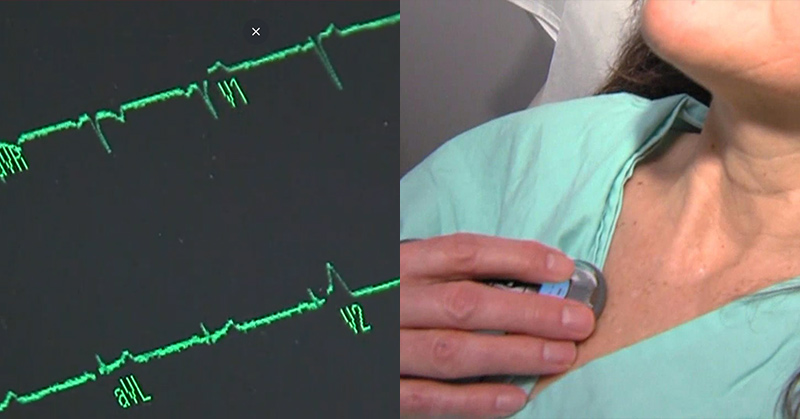Apparently, 12 is the magic number. And I’m not just saying that because I got my first period at age 12.
Getting your first period, sometimes referred to as menarche, before or after this age can increase your risk for heart problems, including heart attack, stroke, and even heart failure.
However, most women aren’t aware of this fact—nor are their physicians. But authors of a new study published in the Journal of the American Heart Association are calling for cardiologists and other doctors to ask female patients about the age of their first period to better understand their heart attack risk [1].
Dr. Carl Pepine, one of the co-authors of the study, says that the age of a woman’s first period isn’t present in 90 percent of medical records. Yet, women who get their first periods outside of this age have a higher risk of major adverse cardiac events (MACE).
Why don’t doctors know about this, and what does the research say about the link between these two factors? Here’s what you need to know.
What the Study Revealed About the Age of Menarche and Risk for Heart Problems
The study showed that girls who started menstruating at age 10 or younger were four times more likely to have a heart attack, stroke, heart failure, or premature death later in life than girls who started menstruating at age 12.
For girls who began their period at ages 11, 13, 14, or 15 and older were more than twice as likely to experience a major cardiac event.
These results were based on information taken from 648 women who were tracked for six years to assess any major heart problems. The results concluded that beginning your period earlier or later than 12 years of age was associated with a higher risk for adverse cardiovascular (heart) disease outcomes.
This isn’t the first research of its kind showing that women who got their period early or late, using age 12 as the reference, have an increased likelihood of heart problems later in life. Another study published in The British Medical Journal showed that early menarche was associated with an increased risk of cardiovascular risk later in life [2].
And other research on a larger number of women—1.2 million to be exact—showed that early and late menarche was associated with increased risk of vascular disease [3].
Vascular disease is an abnormal condition of the blood vessels which can impact circulation, and can cause chest pain and heart attack [4].
What You Need to Know About Women and Heart Attack Symptoms
Unfortunately, heart disease is the leading cause of death for both men and men worldwide [5].
Women can also experience different heart attack symptoms than men, which makes it essential to be aware of the symptoms. While men may experience chest pain, pressure or discomfort, women are more likely to experience symptoms such as [6]:
- Shortness of breath
- Nausea
- Abdominal pain
- Dizziness
- Fatigue
- Sweating
- Vomiting
- Pain in one or both arms
- Neck, jaw, shoulder, and back pain
In addition, women are more likely to have coronary microvascular disease, which affects smaller arteries rather than larger ones [7]. But where does the age of a woman’s first period come into play here?
Previously, medical professionals thought that the longer the body was exposed to estrogen (via the hormonal changes that influence menstruation and fertility), the lower heart attack risk was. But now, these newly published findings are showing that heart attack risk increases with not just women who are exposed to estrogen longer due to early menarche, but for those with a late one as well.
Dr. Pepine says that there are inflammatory markers in the blood of women who had their first periods outside of age 12. Two such markers are serum amyloid A protein (SAA) and C-reactive protein (CRP) and they can predict obstructive coronary artery disease in women.
“They appeared to have a very strong correlation with the adverse outcomes that these women experienced later on in life,” Dr. Pepine said. His theory appears to be that something in the body related to menstruation causes this inflammation, which can involve blood vessels and affect heart disease risk later in life.
There’s still much to be understood here, and the research is far from conclusive. However, this information can empower women to be more aware of their heart attack risk and take preventative steps accordingly.
Why Doesn’t My Doctor Know? (And Is There Anything You Can Do?)
Unfortunately, even though some research regarding early or late menarche and heart attack risk dates back to half a decade ago, the idea that menarche age can influence cardiovascular risk later in life is not yet widely accepted in the medical community. So what can you do?
Tell Your Doctor
It’s up to us as women to share this information with our doctor and, should they be unaware of the relevance of this information, we can reference studies such as this one. Dr. Pepine suggests telling your doctor if you began your period before or after age 12. And, if you’re a parent and your daughter started menstruating before or after age 12, tell your pediatrician, as it’s never too early to monitor for heart problems.
Be Aware of the Symptoms
Dr. Pepine also says that if you had very early or late menarche, be aware of the symptoms of heart disease or a heart attack. If you have heart disease symptoms—which could include fatigue, heart palpitations, or swelling in your lower extremities—be vigilant about seeking medical care [8].
Know Your Risk
If you know you have a higher risk of heart problems based on your age of menarche or family history, be smart about taking care of yourself. Keep an eye on your blood pressure, exercise, and eat healthy!
Can You Influence When You Get Your Period?
Currently, many medical professionals say there’s not much a girl can do to influence when she gets her first period. However, there is research supporting that a greater intake of cow’s milk and milk products can lead to an earlier menarche age [9].
And research also shows that girls who experience early menarche are “significantly more often overweight/obese” and that obesity or being overweight could be a predictor for getting your first period before the average age [10].
In fact, there’s even research that suggests that reducing body mass index (BMI) in girls who experience an earlier menarche could help reduce their risk for cardiovascular disease in the future [11].
While the medical community is still understanding the link between the age of a woman’s first period and heart disease risk, in the meantime, we can all take preventative measures to lower our risk regardless of what age we got our first period. These steps include what Dr. Pepine highlighted—stay at a healthy weight, eat healthy, limit alcohol, and watch your blood pressure and cholesterol (and, of course, don’t smoke!).
Sources
- https://www.ahajournals.org/doi/10.1161/JAHA.119.012406
- https://heart.bmj.com/content/104/13/1069
- https://www.ahajournals.org/doi/10.1161/CIRCULATIONAHA.114.010070
- https://stanfordhealthcare.org/medical-conditions/blood-heart-circulation/vascular-disease/causes/effects.html
- https://www.who.int/gho/mortality_burden_disease/en/
- https://www.mayoclinic.org/diseases-conditions/heart-disease/in-depth/heart-disease/art-20046167
- https://www.heart.org/en/health-topics/heart-attack/angina-chest-pain/coronary-microvascular-disease-mvd
- https://medlineplus.gov/ency/patientinstructions/000775.htm
- https://www.ncbi.nlm.nih.gov/pmc/articles/PMC3038976/
- https://www.ncbi.nlm.nih.gov/pubmed/22570951
- https://journals.plos.org/plosone/article?id=10.1371/journal.pone.0209355
- https://www.today.com/health/heart-disease-women-age-first-period-can-impact-heart-attack-t166893

